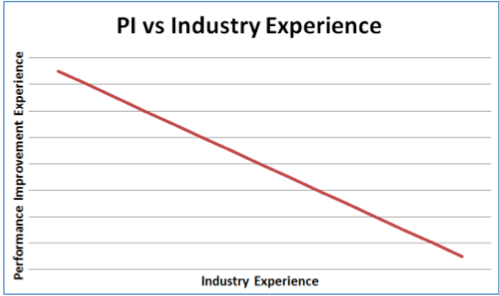
5 Imperatives to Hiring a Lean Six Sigma Expert for Your Hospital
Hiring an expert is often one of the first steps taken by hospitals embarking upon a Lean Healthcare or Lean Six Sigma for healthcare program. Usually a Lean Six Sigma Black Belt is chosen to develop the program. Unfortunately, there are few Black Belts at large that actually have the Lean Six Sigma skills and healthcare experience necessary to build an effective, self-sustaining program.
The effort to search for and recruit an individual with the right fit is a difficult, yet critical activity that requires a generous time commitment from a deployment leader. A wrong hire will cause tremendous setbacks for the program and will risk the buy-in of senior leaders in your organization. This newsletter series will work through five imperatives to hiring a Lean Six Sigma expert for your hospital so you can get the kind of talent on board that will make a big difference for your organization.
Imperative #2: Decide on Industry vs. Healthcare Experience.
The culture in healthcare organizations is the most unique I have come across. While most organizations tend to circle the wagons around their core technical skills—that is, the lead accountant at a law firm is always treated a little differently since he or she is not a lawyer; within healthcare I have found that is held even truer for those not in direct patient care. That is not to say that others are not treated with all due respect, it is just that the culture is patient centered and those that touch the patient are the core employee group. How does this relate to the issue of the importance of healthcare specific experience for practitioners?  Can a highly skilled performance improvement (PI) practitioner without healthcare experience be successful in a healthcare organization? The basic tenet of PI practitioners is that a highly skilled, advanced practitioner should be able to lead improvement teams in any industry. The more experienced the practitioner is, the less industry-specific knowledge they need (see the chart to the right). The basic premise across all industries is that the expertise should come from the subject matter experts on the team, those same experts tend to believe that without industry-specific expertise, the practitioner cannot successfully lead the team. This is even more prevalent in healthcare.
Can a highly skilled performance improvement (PI) practitioner without healthcare experience be successful in a healthcare organization? The basic tenet of PI practitioners is that a highly skilled, advanced practitioner should be able to lead improvement teams in any industry. The more experienced the practitioner is, the less industry-specific knowledge they need (see the chart to the right). The basic premise across all industries is that the expertise should come from the subject matter experts on the team, those same experts tend to believe that without industry-specific expertise, the practitioner cannot successfully lead the team. This is even more prevalent in healthcare.
What is the solution? One can choose to ignore this bias towards industry experience and seek out the best candidate regardless of healthcare experience. With the right candidate, I have little doubt this can work; but, we all know that even in the best of circumstances, the hiring process is a tricky one—it is definitely a caveat emptor or let the buyer beware situation. It is exacerbated even more when an organization is hiring outside its core competency! In chapter five of Performance Improvement for Healthcare: Leading Change with Lean, Six Sigma, and Constraints Management there is a discussion on three options for obtaining advanced practitioner services: buy, rent, or grow. While each has its benefits, we have found that, within healthcare, that growing one—selecting internal candidates and developing them—is generally the best choice. The primary reason is that highly skilled practitioners with healthcare experience are hard to find—let alone entice away from the current employer. The other reason is that internal candidates can be selected based on leadership experience with them, as well as the fact that the right candidate can have immediate credibility within the organization—making the acceptance and change management pieces of the deployment smoother.
While each has its benefits, we have found that, within healthcare, that growing one—selecting internal candidates and developing them—is generally the best choice. The primary reason is that highly skilled practitioners with healthcare experience are hard to find—let alone entice away from the current employer. The other reason is that internal candidates can be selected based on leadership experience with them, as well as the fact that the right candidate can have immediate credibility within the organization—making the acceptance and change management pieces of the deployment smoother.
Which approach is used to fill advanced PI practitioner positions, it is strongly recommended that candidates are interviewed by experienced PI practitioners who can evaluate their current skill level or their potential to grow into the demanding and important role.
Previous Editions
Imperative #1: Know How to Evaluate Technical Proficiency


Follow Us: